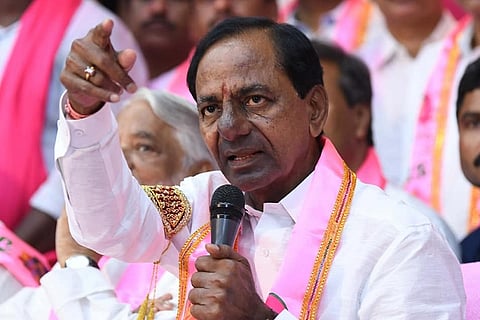

On Sunday, Telangana Chief Minister K Chandrasekhar Rao hosted lunch for nearly 500 Telangana Road Transport Corporation (TSRTC) employees across the 97 depots in the state at his official residence in Begumpet. In a meeting post lunch, he gave a pep-talk to the workers, who had rejoined work after striking for nearly two months. The CM declared that he would ensure TSRTC would become profitable in the next four months if the employees worked under his guidance. And then, he showered “gifts” on the workers – reimbursement of PF dues, money for their cooperative society, increase in age of retirement, improving amenities, a promise not to privatise TSRTC.
Many of these 'gifts' that KCR seemingly showered on the employees were in fact demands that the workers had made during their strike. But when they were on a strike, all that KCR did was snub them and insult them. He declared them "self dismissed" and called the TSRTC a "gone case". He refused to meet the protesters, and did not blink even as desperate workers were killing themselves, seemingly over this impasse. Even as the impasse has ended now, and KCR decided to be a ‘responsible Chief Minister’ and allowed the defeated workers to rejoin work, he declared that the suicides and other deaths during the strike were the fault of the unions that had called the strike.
“The reason I behaved harshly was to make you (employees) realise the politics of the unions,” he said. But KCR’s underlying message is clear: there is no space for dissent in the state under him. And if someone has any problem, they can only get it solved by ‘pleading’ with him, by appealing to him to be benevolent, and not revolting against him.
The agitator turned autocrat
Ironically, KCR became the face of the Telangana statehood movement after several protests. But once he rode to power, he seems to have decided to apply different standards to himself and the rest of the citizenry.
In fact, before he became the Chief Minister – before the first elections in the newly formed state of Telangana – KCR had proclaimed that he would make a Dalit leader as a chief minister of the new state. “If I make a promise I would rather behead myself than fall back on promise,” he had declared.
However, once TRS emerged victorious and it was time to decide on the chief minister, KCR chose to keep power with himself. TRS continues to renege on the promise even after it had formed government for the second time following elections in December 2018.
Further, once he assumed power, he infamously tried to close down Dharna Chowk in Hyderabad, which has been a protest venue for decades, under the excuse of "disturbance to residents". After the High Court pulled up the government, they had to backtrack.
The feudal lord
In Dalit circles and among civil society members, the current KCR regime is called Dora Palana – a feudal lord’s regime. KCR’s actions over the years have cemented this understanding. His recent outburst against employee unions also reflect this.
On several occasions – this, this and this – the CM showered a certain community with gifts without formulating any policy, thereby undermining the constitutional spirit. In his first term in 2014, KCR went on a spree of allotting lands to several communities including the affluent communities of Brahmins and Reddys – all traits of a feudal lord and not an elected Chief Minister. He even spent state funds on offering gold to Hindu temples to fulfill his own personal beliefs, which is antithetical to democracy.
Further, KCR has done little to dispel the belief that he is a feudal lord. The complete centralisation of power in his government, and the ‘token’ ministers who speak only after authorisation from the CM is a testimony to this.
Before the TSRTC workers threatened a strike, Transport Minister Puvvada Ajay should have held meetings with them. However, that didn’t happen. Only a committee of the TSRTC management held talks with the JAC, that too when the protest deadline was nearing. As the talks failed, the JAC went ahead with the strike.
TSRTC is one of the biggest organisations in the state that directly touches the everyday life of people. The employees have returned to work and ended their strike in the face of an unrelenting CM who sees himself as a ‘ruler’ of the people and not the people’s representative. While there is unhappiness among other workers who keep the state running – like the revenue department – there is hesitance now to go the protest route against the government. The TSRTC strike episode has created a ripple-effect, and left a message that citizens have to be submissive to the government.
Justice Chandrachud who previously enjoyed the status of a liberal icon, rightly said, “Dissent is the safety valve of Democracy.”
But dissent, for now, seems to have died a premature death in the state, fully aided by an autocratic Tsar.